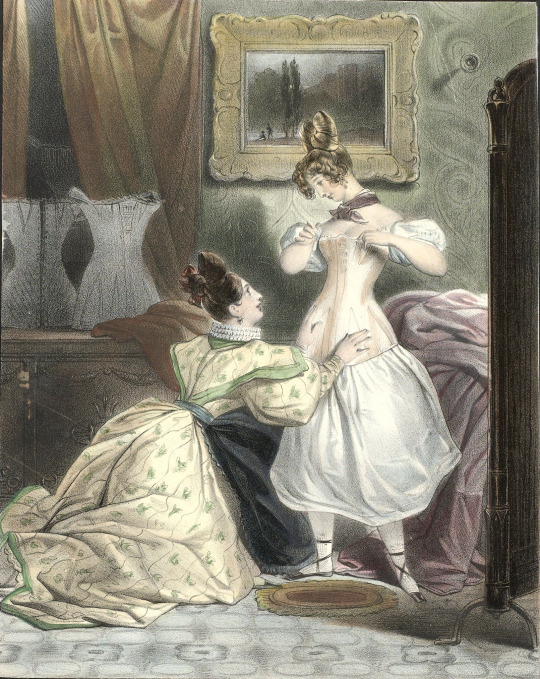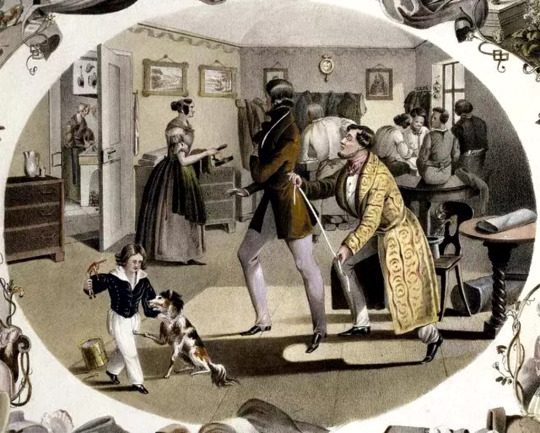#also i have been sleeping on michael zakim's book it's really good
Text

'La M. de la Corsets': c. 1832 lithograph showing a dressmaker or tailoress and client. The undergarments depicted include sleeve-plumpers.
1830s Thursday: Big sleeves, and even bigger dreams for women’s rights.
The growing vulnerability of working women in industrial society provoked a forceful response. In 1825 hundreds of them went out on strike against New York City clothing houses. In 1831 these same women organized themselves into a mass-membership United Tailoresses’ Society. At a time when journeymen were still devoting their political efforts to a defense of artisanal prerogatives in the master’s shop, these “tailoresses” (the appellation itself testified to an advanced degree of industrial consciousness, excluding as it did the more traditional dressmaking of the “sempstress”) already understood that in a capitalist economy no aspect of the work relationship remained non-negotiable. [...]
No one can help us but ourselves, Sarah Monroe, a leader of the United Tailoresses’ Society, declared. Tailoresses should consequently organize a trade union with a constitution, a plan of action, and a strike fund. Only then could we “come before the public in defense of our rights.” The Wollstonecraftian rhetoric was conscious. Lavinia Wright, the society’s secretary, argued that the tailoresses’ low wages and hard-pressed circumstances were a direct result of the way power was organized throughout society to ensure women’s subordination in all social relations.
— Michael Zakim, Ready-Made Democracy: A History of Men's Dress in the American Republic, 1760-1860
I was disappointed in my search for pictures of Sarah Munroe, Lavinia Wright, or really anything to do with the United Tailoresses’ Society. One online article outright stated, “We know very little about this speaker, Sarah Monroe, other than that she was a garment worker and president of the newly formed United Tailoress Society -- the first women-only union in the United States.”
I am in awe of this working-class woman, Sarah Monroe, who is quoted by Michael Zakim as saying in 1831:
It needs no small share of courage for us, who have been used to impositions and oppression from our youth up to the present day, to come before the public in defense of our rights; but, my friends, if it is unfashionable for the men to bear oppression in silence, why should it not also become unfashionable with the women?

'The Tailor's Shop': 1838 lithograph by Carl Kunz and Johann Geiger
#1830s#fashion history#labor history#labour history#us history#sarah monroe#Eighteen-Thirties Thursday#united tailoresses' society#michael zakim#women's history#also i have been sleeping on michael zakim's book it's really good#there were many strikes by female garment workers in the time period#amazingly forward-thinking they were trying to get sick pay and retirement benefits#they also campaigned against prison labour#tailors#dress history#inequality#industrial relations#19th century
378 notes
·
View notes